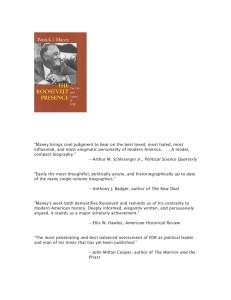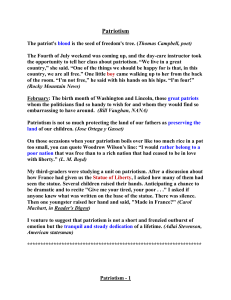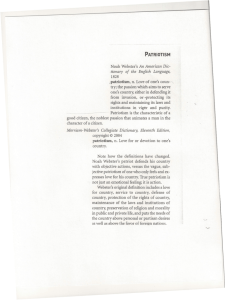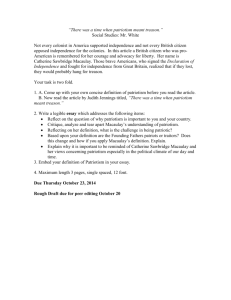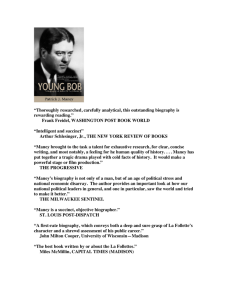Contesting Patriotism: Culture, Power and Strategy in the Peace Movement
advertisement
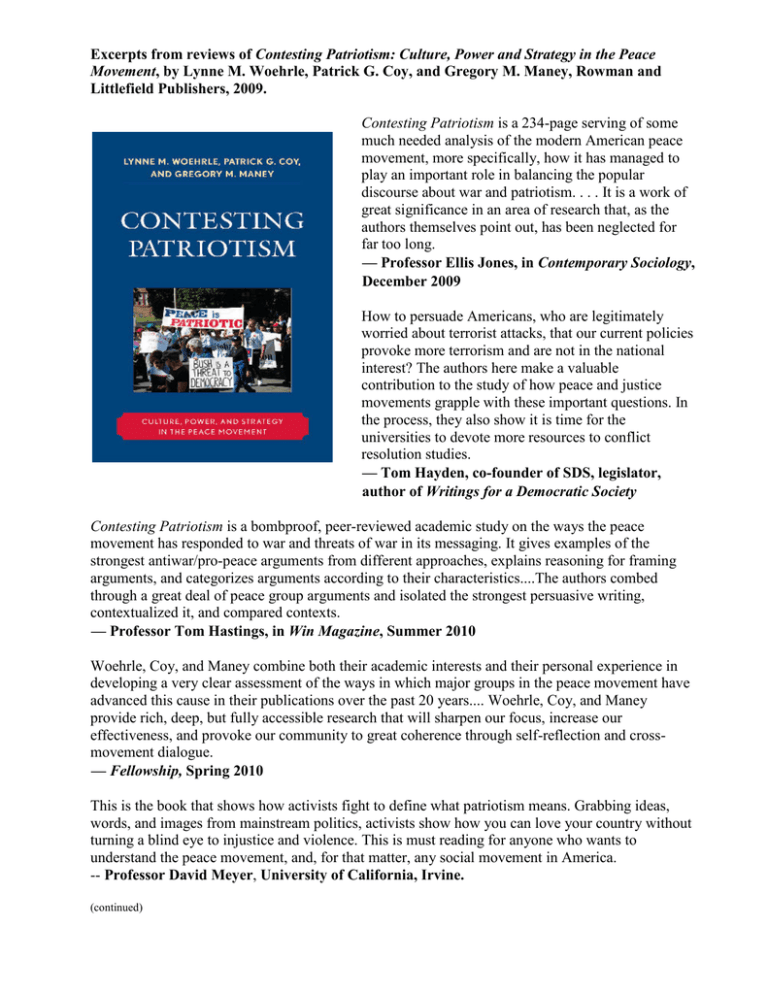
Excerpts from reviews of Contesting Patriotism: Culture, Power and Strategy in the Peace Movement, by Lynne M. Woehrle, Patrick G. Coy, and Gregory M. Maney, Rowman and Littlefield Publishers, 2009. Contesting Patriotism is a 234-page serving of some much needed analysis of the modern American peace movement, more specifically, how it has managed to play an important role in balancing the popular discourse about war and patriotism. . . . It is a work of great significance in an area of research that, as the authors themselves point out, has been neglected for far too long. — Professor Ellis Jones, in Contemporary Sociology, December 2009 How to persuade Americans, who are legitimately worried about terrorist attacks, that our current policies provoke more terrorism and are not in the national interest? The authors here make a valuable contribution to the study of how peace and justice movements grapple with these important questions. In the process, they also show it is time for the universities to devote more resources to conflict resolution studies. — Tom Hayden, co-founder of SDS, legislator, author of Writings for a Democratic Society Contesting Patriotism is a bombproof, peer-reviewed academic study on the ways the peace movement has responded to war and threats of war in its messaging. It gives examples of the strongest antiwar/pro-peace arguments from different approaches, explains reasoning for framing arguments, and categorizes arguments according to their characteristics....The authors combed through a great deal of peace group arguments and isolated the strongest persuasive writing, contextualized it, and compared contexts. — Professor Tom Hastings, in Win Magazine, Summer 2010 Woehrle, Coy, and Maney combine both their academic interests and their personal experience in developing a very clear assessment of the ways in which major groups in the peace movement have advanced this cause in their publications over the past 20 years.... Woehrle, Coy, and Maney provide rich, deep, but fully accessible research that will sharpen our focus, increase our effectiveness, and provoke our community to great coherence through self-reflection and crossmovement dialogue. — Fellowship, Spring 2010 This is the book that shows how activists fight to define what patriotism means. Grabbing ideas, words, and images from mainstream politics, activists show how you can love your country without turning a blind eye to injustice and violence. This is must reading for anyone who wants to understand the peace movement, and, for that matter, any social movement in America. -- Professor David Meyer, University of California, Irvine. (continued) Coy, Maney, and Woehrle detail ways in which PMOs create "oppositional knowledge" by introducing new information into public debates, critiquing official lines of argument, envisioning new social and political arrangements, and calling people to action…. Contesting Patriotism is notable for its research design that captures both the agency of social movement organizations and the political and cultural contexts that constrain and enable them in shaping political discourse…. The authors' systematic discourse analysis is impressive and compelling. The book is well referenced….I highly recommend Contesting Patriotism for its clarity because it offers a new level of focus on activists’ cultural agency, and because it synthesizes many emerging interests in the cultural study of social movements. — Professor Lee A. Smithey, in Critical Mass, Fall 2010 The study is well-structured and progresses logically…The research method allows for insightful conclusions to be drawn, which will benefit PMOs worldwide in the construction of messages aimed at the public. Activists can target their campaigns more effectively and, by looking at the longitudinal findings, can ensure their messages have effective sustainability. ..Throughout the book, one is made aware of the strength of social movements and their necessity in political landscapes today. ..This book also opens up a new avenue of research for academics researching Latin American or African social movements…This book is of significant importance…A piece of work that sets the standard for future research very high. — Professor Janeske Botes, in Interface, May 2010 Those who advocate for peace have too often had their patriotism questioned. This carefully reasoned and richly researched book provides a set of tools to help reshape the discourse about who speaks for America in matters of war and peace. This timely book is vitally important for all who seek new ways to turn this country away from the catastrophic policies that, in the name of patriotism, have deeply harmed Americans' interests at home and abroad. — Professor Andrew L. Barlow, author of Between Fear and Hope: Globalization and Race in the United States We wring our hands about the culture of violence that pervades our nation, and some of us expend enormous energy trying to change our country's rhetoric from one of war to one of peace. We act locally and from within esteemed national peace groups such asthe Fellowship of Reconciliation, Pax Christi, War Resisters League, and the American Friends Service Committee. But the wars-and the worries-persist. What should we do? And how? Contesting Patriotism gives us a language to talk about our dilemmas. In it, Lynne Woehrle, Pat Coy, and Greg Maney describe the rhetoric used by peace organizations and then give us real solutions as we look to the future. Contesting Patriotism is an academic book, complete with an 11-page bibliography, but it's written by professors who are themselves activists and is eminently readable. It's a must-read for anyone who wants to move from wailing about strategy to truly working for peace… — Professor Rosalie Riegle, in Sojourners, July 2009 Contesting Patriotism provides an intellectually complex, nuanced analysis of the conflicting uses of patriotism by war and peace forces in the modern world. Scholars, peace activists, government officials, and member of the general public can learn much from it. —Professor Lawrence Wittner, in History News Network, May 2009 (Continued) Woehrle, Coy, and Maney have performed a notable public service with Contesting Patriotism. Readers get solid evidence for the authors’ claims that historical context, organizational identity, and perceived audience matter as PMOs produce oppositional knowledge and fight hegemony. We are reminded that PMO discourse work is strategic, varying with political climate and political space. The authors show us that peace protest is among the highest forms of patriotism. — Professor Steve Breyman, in Policy Sciences, November, 2010 In an era when U.S. nationalism and unilateralism are arguably the biggest threats to world peace and security, Woehrle, Coy, and Maney offer an important analysis of how culture can be used as a strategic tool for those seeking to promote a more peaceful and just world. — Professor Jackie Smith, Director, Center for the Study of Social Movements and Social Change, University of Notre Dame Contesting Patriotism opens with a Millsean truism—foreign policy is routinely driven by elites who use patriotic slogans to justify their endeavors. The team of Woehrle, Coy, and Maney then promise a study that delineates the ways that peace movement organizations (PMOs) promote “public dialogue and official accountability on matters of foreign policy” (p. 4). In focusing on how PMOs distribute oppositional knowledge that either challenges or harnesses the “dominant symbolic repertoire” of war, this book is firmly entrenched the framing literatures of Snow, Benford and Gamson as well as some discourse analysis of Gramsci, Edelman, and Foucault. By deftly integrating such theories into an impressive longitudinal study, this book should have a wide readership… As a whole, Contesting Patriotism offers a comprehensive, detailed, and nuanced reading of how PMOS handle framing tasks. -Professor Eric Swank, in Mobilization, September, 2010. Peace movement organizations operate in a diverse social and political climate, one distorted by rhetoric of fear and lies. That's why the peace movement has hungered of late for an informed, analytic framework to assess where we are and where we go next. Woehrle, Coy and Maney provide rich, deep, but fully accessible research that will sharpen our focus, increase our effectiveness, and provoke our community to "smart growth" through self-reflection. This is a very timely gift. It will give us direction with its GPS-like utility, and it offers encouragement in its C. Wright Mills-like sensibility for social change as a legitimate expression of patriotism. — Dr. Mark C. Johnson, executive director, Fellowship of Reconciliation-USA Professors Woerhle, Coy, and Maney have written an interesting book about how peace movement organizations (PMOs) have marketed their messages to promote public dialogue on matters of foreign policy…These authors help explain how peace organizations challenge the dominant cultural views with opposing knowledge that can sometimes harness the popularity of dominant cultural messages and sometimes challenges hegemonic discourse. PMOs engage the public in discourses that can put pressure on the government to change policies that support war…Most impressive about this book is the data that has been surveyed in order to reach conclusions about the antiwar discourses. The authors have analyzed 510 documents—press and media releases, printed statements, editorials and public calls to action from fifteen different peace movement organizations during five different conflict periods between March 1990 and August 2005. --Professor Ian Harris, in Journal of Religion, Conflict and Peace
